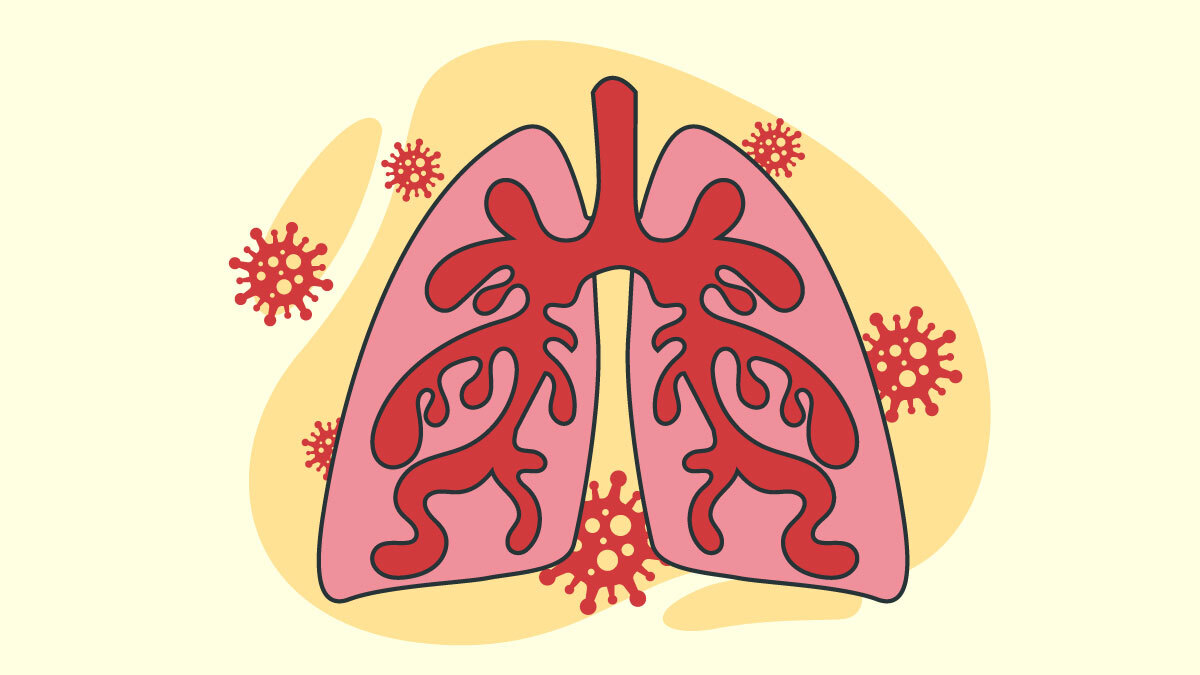Does Smoking Weed Cause Pneumonia?

Let’s start with a different question. Does eating lettuce cause bacterial infections?
Not usually, of course. The stomach cramps, abdominal pain, and other symptoms associated with an E. coli infection only occur when you’ve eaten contaminated lettuce. And if your immune system is weak or compromised, chances are much greater that the infection will be serious.
There haven’t been many studies conducted on the subject of cannabis and pneumonia. But research conducted so far indicates that the connection between smoking marijuana and pneumonia is similar.
Smoking cannabis doesn’t cause pneumonia all by itself. If your stash is contaminated, though, that might be enough to bring on pneumonia or something even worse. And the possibility of contracting pneumonia is even greater for habitual weed smokers.
Let’s put on our science hat.
What Is Pneumonia?
Pneumonia is a lung infection that causes the air sacs in the lungs to fill with fluids or pus. It causes symptoms like shortness of breath (sometimes accompanied by chest pain), nausea and vomiting, fever and chills, and a cough that brings up mucus.
The severity of pneumonia cases can range from “slight inconvenience” to life-threatening. Some patients only have to spend a few days out of work. Others can develop permanent lung damage, respiratory or kidney failure.
What Causes Pneumonia?
The American Lung Association reports that pneumonia can be caused by fungi, bacteria, and/or viruses (including COVID-19 and the flu). It’s more likely to develop in those with weakened immune systems and those with respiratory problems. That would suggest that simply smoking weed can’t cause pneumonia all by itself.
Tobacco smoking doesn’t cause pneumonia, either. However, research shows that the lung damage associated with cigarette smoking makes it a major risk factor for infections like pneumonia, and increases the possibility of dying from lung disease. In both cases (getting pneumonia and dying from it), an additional risk factor is a compromised immune system.
There’s one more thing to consider. Tobacco can be contaminated by fungi, and a meta-analysis of research has found that smoking increases peoples’ risk of developing invasive fungal diseases that can cause pneumonia.
OK, that’s cigarettes. What about weed?
As we’ve said, there aren’t many studies to guide us. But what science does know is that smoking cannabis can cause both lung damage and immune system problems – and that weed can be contaminated with fungi as well.
Health Risks of Smoking Weed

There’s no denying the fact that marijuana can provide medical benefits (unless you ask some of the politicians in states that haven’t legalized it yet).
That doesn’t mean it’s completely benign, though. Here are the potential negative effects that are relevant to our discussion.
Weed smoke has been found to damage the cilia, small hairs in the respiratory tract that are responsible for clearing toxins from the lungs. It can cause coughing, increased production of mucus, and hyperinflated (overinflated) lungs, although there’s no proof it can lead to the development of COPD or lung cancer.
The lung damage that can occur, which increases in severity over time and with higher cannabis consumption, can make marijuana smoking a risk factor for developing pneumonia, just like cigarette smoking. There’s no evidence showing that the risk is equal to (or greater than) the risk run by tobacco smokers, and there’s no data on exactly how great the risk is. But it’s certainly more than zero.
We’ve also mentioned that pneumonia can develop or become worse if a patient is immunocompromised. That could be a problem for weed smokers as well.
It’s commonly reported that cannabis has anti-inflammatory properties. There’s a second finding that’s not discussed as often, though. Studies have shown that marijuana may also harm the ability of white blood cells to fight infections, and reduce the number of cells that prevent the spread of microbial infections in the body. And the more weed people smoke, the greater that immune issue becomes.
So cannabis smoking can cause lung damage and a potentially-lower ability to fight the microbes that can cause pneumonia. That makes it clear that long-time or heavy smokers would be more likely to contract pneumonia if exposed to the bacteria, viruses, or fungi that can cause it. They’d also have the risk of developing more severe cases.
It’s time to talk about contaminated weed.
Weed and Fungi
Nothing’s guaranteed in life. It does seem, however, that if you smoked up in a protective bubble – far away from anyone or anything that carried microbes that could cause pneumonia – you’d have virtually no risk of contracting it in the first place.
Unfortunately, that’s not quite true.
We’ve already talked about the possibility of tobacco being contaminated with fungi. The same thing can happen to marijuana.
Some types of fungus can be beneficial to marijuana plants. For example, mycorrhizal fungi attach themselves to the roots of cannabis plants (including hemp), expand into the soil, and serve as a “second” root system.
Other fungi aren’t beneficial at all. An Israeli study isolated several fungi in weed plants that could harm patients, like Penicillium (a different strain of which can be used to produce penicillin) and Aspergillus.
Aspergillus is the one that interests us most because research has determined that it can cause pneumonia, invasive fungal disease, and allergic lung disease. That’s been seen most often in people with asthma and cystic fibrosis; asthma is an autoimmune condition, and CF patients have been shown to be missing a molecule the immune system needs to defend the body.
In short, Aspergillus can be in your weed, and it can cause pneumonia in those with immune system problems.
That’s not just theory. Two cases of allergic bronchopulmonary aspergillosis, a condition that mimics pneumonia, have been linked to the use of moldy marijuana. Another case involving a similar but even more serious condition, chronic necrotizing pulmonary aspergillosis, affected a cannabis-smoking patient who had been buying moldy weed on the street.
Needless to say, those were isolated cases. They do underscore the fact, however, that not only can habitual weed smoking make you more likely to contract pneumonia – the bud itself may cause it.
Health Canada now irradiates some of the marijuana sold to medical patients to ensure it doesn’t contain mold spores. But until the same is done for all cannabis sold in America, the unlikely but possible danger of developing pneumonia from smoking weed remains.
Does Smoking Weed Cause Pneumonia: FAQ
Q: Is there anything other than the length of time you’ve been smoking, and how often you smoke, that would make it more likely that you get pneumonia?
A: Nothing definitive, but in that case of chronic necrotizing pulmonary aspergillosis, researchers believe that the patient’s regular use of a bong – to get much deeper hits – may have played a role in the harm done to his lungs.
Q: Does vaping carry as much risk as smoking?
A: In general health terms, no. But it has been shown to cause lung damage as well, and there’s been one case of acute eosinophilic pneumonia which researchers theorize may have been caused by vaping weed.
References
- Jiang, C., Chen, Q., & Xie, M. (2020). Smoking increases the risk of infectious diseases: A narrative review. Tobacco Induced Diseases, 18. [1]
- Bello, S., Menéndez, R., Antoni, T., Reyes, S., Zalacain, R., Capelastegui, A., … & Ruiz-Manzano, J. (2014). Tobacco smoking increases the risk for death from pneumococcal pneumonia. Chest, 146(4), 1029-1037.
- Pourbaix, A., Lafont Rapnouil, B., Guéry, R., Lanternier, F., Lortholary, O., & Cohen, J. F. (2020). Smoking as a risk factor of invasive fungal disease: Systematic review and meta-analysis. Clinical Infectious Diseases, 71(4), 1106-1119. [3]
- Tashkin, D. P. (2013). Effects of marijuana smoking on the lung. Annals of the American Thoracic Society, 10(3), 239-247.
- Yayan, J., & Rasche, K. (2016). Damaging effects of cannabis use on the lungs. Advancements in Clinical Research, 31-34.[5]
- Nagarkatti, P., Pandey, R., Rieder, S. A., Hegde, V. L., & Nagarkatti, M. (2009). Cannabinoids as novel anti-inflammatory drugs. Future medicinal chemistry, 1(7), 1333-1349.
- Pacifici, R., Zuccaro, P., Pichini, S., Roset, P. N., Poudevida, S., Farré, M., … & De la Torre, R. (2003). Modulation of the immune system in cannabis users. Jama, 289(15), 1929-1931.
- Jerushalmi, S., Maymon, M., Dombrovsky, A., & Freeman, S. (2020). Fungal Pathogens Affecting the Production and Quality of Medical Cannabis in Israel. Plants, 9(7), 882. [8]
- Tedeschi, A., & Asero, R. (2008). Asthma and autoimmunity: a complex but intriguing relation. Expert review of clinical immunology, 4(6), 767-776.
- Gargani, Y., Bishop, P., & Denning, D. W. (2011). Too many mouldy joints–marijuana and chronic pulmonary aspergillosis. Mediterranean journal of hematology and infectious diseases, 3(1).
- Remington, T. L., Fuller, J., & Chiu, I. (2015). Chronic necrotizing pulmonary aspergillosis in a patient with diabetes and marijuana use. CMAJ, 187(17), 1305-1308.
- Waisglass, B. R. (2015). Aspergillosis spores and medical marijuana. CMAJ, 187(14), 1077-1077.
- Antwi-Amoabeng, D., & Islam, R. (2020). Vaping Is Not Safe: A Case of Acute Eosinophilic Pneumonia Following Cannabis Vapor Inhalation. Case reports in pulmonology, 2020. [13]